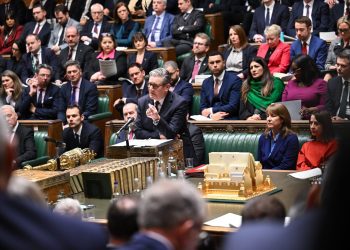Politics once moved at the pace of persuasion. A leader would make a case, tour the country, take questions, debate opponents – and then wait weeks or months to see whether the argument had landed. That rhythm is gone.
Now every morning begins with another batch of numbers: headline voting intentions, leader ratings, favourability trackers, approval trends. They’re dissected on social media before most people have made it through their first coffee. What used to be a barometer has turned into a blizzard.
The scale of it is striking. Mark Pack’s PollBase records almost every national survey since the 1930s. In 2005, there were 133 Westminster polls. By 2015 the total had doubled. Last year there were more than 500 – more than one every day. We are measuring public opinion more often than we are listening to it.
This constant stream of data is changing how politicians behave. When every twitch in a tracker becomes a front-page story, ministers and their advisers feel the pressure to act like day-traders – buying and selling policies according to the market price of the moment. The temptation to smooth every rough edge, to echo the latest focus group rather than trust one’s own judgement, becomes almost irresistible.
It wasn’t always this way. During her time in office, Margaret Thatcher averaged approximately 82 polls published per year. For Tony Blair, the figure was around 68. They had it relatively easy, David Cameron’s annual estimate was a whopping 369 polls.
Now, polls can of course be useful. They give context, they help to test ideas, they tell us something about the public mood. But the best leaders treat them as reference points, not orders. They understand that data can inform judgment but cannot replace it.
That discipline is fading. Instant surveys, online panels and the permanent chatter of social media have created a culture of reaction. A two-point movement in one poll is treated as a crisis, feeding panic through party WhatsApp groups and parliamentary corridors. Minor volatility is mistaken for catastrophe.
Sir Keir Starmer has spent years chasing the numbers – trimming, triangulating, and testing every sentence until it says nothing at all. It’s politics by spreadsheet, not by principle. It’s why he makes a pledge one moment only to repeatedly break his promises when it’s convenient. The polls reflect precisely that emptiness: a vacuum of conviction that contributes to him being the most unpopular prime minister in recorded history.
By contrast, Kemi Badenoch’s performance at the recent Conservative Party Conference reminded us what leadership looks like when it grows from values rather than from graphs. She took her time. She set out ideas carefully, defended them confidently and refused to be rushed. That steadiness of conviction is what voters recognise as authenticity.
And then there’s Reform. Nigel Farage’s brand of politics is the populist flip side of Starmer’s triangulation – impulsive rather than indecisive, led by applause instead of analysis. His Corbynite decision to scrap the two-child benefit cap is a case in point: a reckless attempt to chase headlines worth billions to the economy. It’s welfare without responsibility, soundbites masquerading as policy. The same lack of discipline ran through their last manifesto, a fantasy balance sheet of uncosted plans that economists warned the Telegraph ‘would trigger an immediate and violent sterling crisis’ that risked blowing an £80 billion hole in the public finances.
The danger is deeper than bad decision-making. Voters sense when politicians are governed by the polls instead of their own principles. They can forgive an unpopular decision if it is honest, but they cannot forgive a leader who seems to believe in nothing at all.
To rebuild trust, our leaders need to relearn how to stand still in the storm. That doesn’t mean ignoring evidence or public sentiment but it does mean separating the signal from the noise – distinguishing what matters this week from what will matter in five or 10 years’ time.
And the rest of us have a part to play. The media, commentators and voters should stop demanding instant answers to every poll movement. Good policy takes time. Conviction politics takes patience. If we want leaders who think deeply, we must give them the space to do it.
Courage in politics is not deafness to public opinion, it is the ability to listen, reflect and decide. The polls will always chatter. Leadership is knowing when to tune them out. Because the country doesn’t need politicians who chase the latest line on a graph, it needs those willing to draw a line – and hold it.
Politics.co.uk is the UK’s leading digital-only political website. Subscribe to our daily newsletter for all the latest news and analysis.
The post Starmer is governed by polls, not principles – voters can sense it appeared first on Politics.co.uk.

































